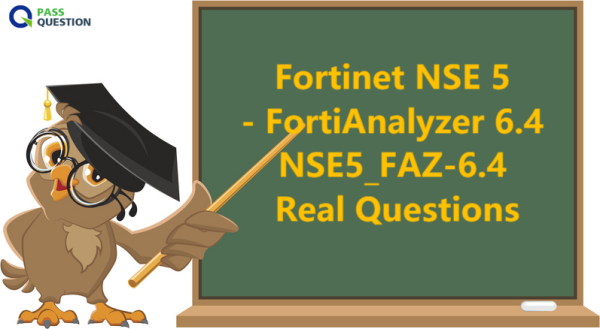Fortinet NSE 5 - FortiAnalyzer 6.4 NSE5_FAZ-6.4 Real Questions
NSE5_FAZ-6.4 Fortinet NSE 5 - FortiAnalyzer 6.4 exam is part of NSE 5 Certification.PassQuestion has prepared Fortinet NSE 5 - FortiAnalyzer 6.4 NSE5_FAZ-6.4 Real Questions from the syllabus so as to ensure that you pass your exam with high scores.It will allow you to improve your preparation level so you can easily clear the Fortinet NSE5_FAZ-6.4 exam.If you are using these NSE5_FAZ-6.4 questions and answers, then you will be able to clear your concepts so you can do well in the real exam.Make sure that you are using all these NSE5_FAZ-6.4 Real Questions that we are creating for you so you can easily clear the Fortinet NSE5_FAZ-6.4 exam on your first attempt.

Fortinet NSE 5 - FortiAnalyzer 6.4
The Fortinet NSE 5—FortiAnalyzer 6.4 exam is part of the NSE 5 Network Security Analyst program, and recognizes the successful candidate's knowledge of and expertise with FortiAnalyzer. The exam tests applied knowledge of FortiAnalyzer configuration, operation, and day-to-day administration, and includes operational scenarios, system configuration, device registration, and troubleshooting.
The Fortinet NSE 5 - FortiAnalyzer 6.4 exam is intended for network and security analysts who are responsible for the configuration and administration of FortiAnalyzer solutions for centralized logging and reporting.
Exam Information
Exam name: Fortinet NSE 5 - FortiAnalyzer 6.4
Exam series: NSE5_FAZ-6.4
Time allowed: 60 minutes
Exam questions: 30 multiple-choice questions
Scoring Pass or fail: a score report is available from your Pearson VUE account
Language: English and Japanese
Product version: FortiOS 6.4.1/FortiAnalyzer 6.4.1
Exam Objectives
System configuration
- Perform initial configuration
- Configure administrative access
- Configure high availability (HA)
- Configure administrative domains (ADOMs)
- Troubleshoot RAID
Device registration and communication
- Register devices in ADOMs
- Troubleshoot device communication issues
- Manage registered devices
Logs and reports
- Protect log data
- Troubleshoot and manage logs
- Configure event handlers
- Customize and generate reports
- Troubleshoot reports
View Online Fortinet NSE 5 - FortiAnalyzer 6.4 NSE5_FAZ-6.4 Free Questions
Which statements are correct regarding FortiAnalyzer reports? (Choose two)
A.FortiAnalyzer provides the ability to create custom reports.
B.FortiAnalyzer glows you to schedule reports to run.
C.FortiAnalyzer includes pre-defined reports only.
D.FortiAnalyzer allows reporting for FortiGate devices only.
Answer:A, B
Which two constraints can impact the amount of reserved disk space required by FortiAnalyzer? (Choose two.)
A.License type
B.Disk size
C.Total quota
D.RAID level
Answer:C, D
Which clause is considered mandatory in SELECT statements used by the FortiAnalyzer to generate reports?
A.FROM
B.LIMIT
C.WHERE
D.ORDER BY
Answer:A
For which two SAML roles can the FortiAnalyzer be configured? (Choose two.)
A.Principal
B.Service provider
C.Identity collector
D.Identity provider
Answer:B, D
You've moved a registered logging device out of one ADOM and into a new ADOM. What happens when you rebuild the new ADOM database?
A.FortiAnalyzer resets the disk quota of the new ADOM to default.
B.FortiAnalyzer migrates archive logs to the new ADOM.
C.FortiAnalyzer migrates analytics logs to the new ADOM.
D.FortiAnalyzer removes logs from the old ADOM.
Answer:C
Which two statements are true regarding log fetching on FortiAnalyzer? (Choose two.)
A.A FortiAnalyzer device can perform either the fetch server or client role, and it can perform two roles at the same time with the same FortiAnalyzer devices at the other end.
B.Log fetching can be done only on two FortiAnalyzer devices that are running the same firmware version.
C.Log fetching allows the administrator to fetch analytics logs from another FortiAnalyzer for redundancy.
D.Log fetching allows the administrator to run queries and reports against historical data by retrieving archived logs from one FortiAnalyzer device and sending them to another FortiAnalyzer device.
Answer:A, B
Comments
Post a Comment